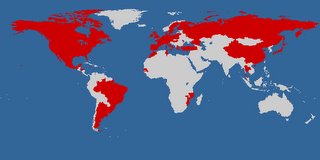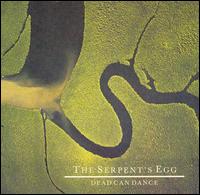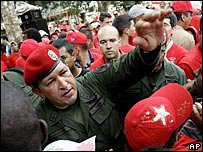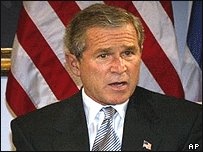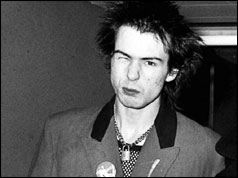Another post on the Palestinian elections? I hesitated a lot, after the avalanche of assessments and declarations from all quarters. Taking as a given the satisfaction at the demonstration of Palestinian electors' attachment to democracy and maturity, as well as concerns at the Hamas victory, I will try to put together a few thoughts and address troubling aspects.
Free elections are an important part of democracy, but not allAll the observers have spoken about the high turn out and how smoothly the Palestinian election went. But several commentators have stressed that democracy implies other things, like guaranteeing the rights of minorities, respect for basic rights and the rejection of violence and, clearly, terrorism as a political weapon. Even if, as Giuliano Amato has said, it would not be the first time that an armed movement "cleansed itself", and the Palestinians have shown themselves to be among the most mature and best prepared of Arab nations for democracy, Palestine has a long way to go before it can be called one. Exactly as their Israeli neighbours.
The difficultyIt is possible that in the next few weeks Hamas will find the practical arrangements to allow it to form a coalition government that might be recognised by the international community, observing the conditions that the European Union and other powers have set out in terms of conduct on terrorism, the truce with Israel, the aim of the two States, etc. The real difficulty for Palestine and for the other Islamic countries resides in the doctrine of the "holy territory of Islam", which cannot be given up and which, consequently, rules out the definitive recognition of Israel. Exactly the same kind of difficulty that Israel has concerning the "holy territory of Israel", ruling out the definitive recognition of Palestine.
Reasons for victorySeveral commentators who know the situation on the ground well have pointed out that the success of Hamas owes much to things which have nothing to do with terrorism. I quote: "Hamas manages a series of welfare organisations, clinics, health centres, schools and universities. In the Gaza Strip, it stands for order and discipline". By contrast, the corruption and personal enrichment of Arafat and his successors, with a few exceptions, is emphasised. This was well known (I wrote it
here, before the results of the elections were known) and the unseemly struggles to seize his bank accounts in Switzerland and elesewhere remain fresh in the memory. The clean up of European finance, which Europe didn't dare do, has been done by Palestinian electors.
Story which doesn't bear scrutinyThe result in Palestine has shown how false and artificial it is to say that support for Islamic extremism would only come from a small fraction of the population. The truth is that each time more or less free elections are held, fundamentalists gain ground, from the Algerian commotion, which we pretend not to remember (the second round was cancelled to prevent a fundamentalist victory), and Iran, Egypt, the Gulf States and, in part, Morocco. Tunisia seems to be the only exception. Europe, while respecting the peoples' choices, must take account of this in its relations with the countries concerned, and even more in its internal policies with regard to the religious authorities of Moslem minorities in the EU. In their own countries, just as in ours, fundamentalist tendencies sometimes call into question hard won gains, especially by women. Moreover, Arab governments which are fighting fundamentalism openly berate European political authorities and powers for their condescension which they believe to be excessive and which contradicts their efforts, and those of moderate Moslems, who want freedom, equality for women and a reasonable interpretation of the holy texts. Humiliating Islam on the basis of prejudices that generalise and don't distinguish between extremists and moderates, doesn't help at all.
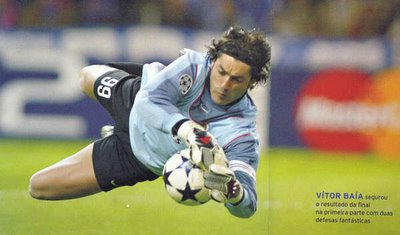 Porto lost yesterday with Benfica 1-0. And lost the hardest way possible for a Porto supporter: a bad goal from one of our symbols: Vitor Baia.
Porto lost yesterday with Benfica 1-0. And lost the hardest way possible for a Porto supporter: a bad goal from one of our symbols: Vitor Baia. Yesterday tough, in what could be a memorable match, he failed in the worse possible way at the worse possible moment, causing the defeat of FC Porto in “Estadio da Luz” for the first time in 5 years (and also the first time in 29 years that Porto lost two matches with Benfica in the same season).
Yesterday tough, in what could be a memorable match, he failed in the worse possible way at the worse possible moment, causing the defeat of FC Porto in “Estadio da Luz” for the first time in 5 years (and also the first time in 29 years that Porto lost two matches with Benfica in the same season).

